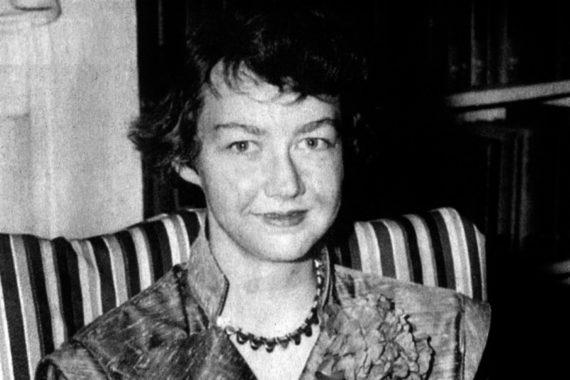
Perhaps it was after watching yet another film depicting the South as irredeemably backwards and bigoted. Or perhaps it was after reading yet another round of commentaries denigrating Robert E. Lee because Lee was a traitor (so were the American revolutionaries, technically), a defender of a slave owning society (as most societies were before the nineteenth century), and ultimately a military failure and “loser” (weren’t Hannibal and Napoleon?). Whatever the cause, I confess I have recently started to grow frustrated with Flannery O’Connor.
What, you might ask, do Hollywood and historical revisionism have to do with one of the most talented and beloved of the South’s writers, who in 1972 won the National Book Award for fiction? Well, perhaps in a time less saturated with woke progressivist attempts to vilify most everything about Southern culture, not much. But in this era of infuriatingly irrational (and hypocritical) prejudice towards Dixie, one yearns for portrayals of her that, if unwilling to praise the South, at least avoid the condescending, unjust caricatures that now serve as conventional perceptions of her in American popular imagination. Dixie, I’m afraid, has been demonized.
That’s quite unfortunate, given O’Connor’s famous line that “while the South is hardly Christ-centered, it is most certainly Christ-haunted.” Indeed, O’Connor, despite her penchant for provocatory criticisms of Southerners, remained one of their most ardent defenders, even during the early days of the Civil Rights Movement, which she endorsed. “Southern writers are stuck with the South, and it’s a good thing to be stuck with,” she once remarked. She elsewhere wryly observed: “Anything that comes out of the South is going to be called grotesque by the northern reader, unless it is grotesque, in which case it is going to be called realistic.”
O’Connor’s literary corpus, of course, tends towards the grotesque — it ain’t called “Southern Gothic” for nothin’! But even in its portrayals of Southerners’ arrogance, ignorance, and hypocrisy, it is also deeply empathic towards the most unsympathetic of people. One of the most remarkable qualities about O’Connor’s literary style is her ability to get inside the mind of her fictional characters — the country redneck lazily idling in the fields; the aged, declassed matriarch trying to maintain her dignity in rapidly-changing modern world; the conceited, disrespectful child too smart for her own good. All of these she describes with a psychological clarity — and a palpable desire to see them redeemed — that is reminiscent of Dostoyevsky.
When Southerners encounter O’Connor’s fictional characters, they can’t help but find themselves observing: “I know that man!” A friend of mine, a Savannah native whose mother went to college with O’Connor, told me: “It’s as if she knew my uncle Bubba.” Perhaps she did.
And the Southern landscape, with what splendid craft and care can she illuminate its hidden beauties even in the midst of disorder and sin. In “A Temple of the Holy Ghost,” she describes a little girl looking out the passenger window of her mother’s car:
She turned it [her face] toward the window and looked out over a stretch of pasture land that rose and fell with a gathering greeness until it touched the dark woods. The sun was a huge red ball like an elevated Host drenched in blood and when it sank out of sight, it left a line in the sky like a red clay road hanging over the trees.
Trees, rivers, the sky are all pregnant with latent spiritually instructive, if often frightful meaning in O’Connor’s mystical portrayal of rural Southern scenery.
The Savannah and Milledgeville native was obviously a master of observation when it came to “her people.” How the heck did she know so much about country life, being able to describe in such intricate detail the feeding of livestock, the workings of farm machinery, or the hunting of wild turkey? She could describe, with apparent casual ease, tractors, rotary hay-balers, silage cutters, combines, and letz mills (I confess I had to look that last one up myself).
Yet for all of this, there are certain characters ubiquitous across the Southern terrain that one seldom encounters in O’Connor’s literary corpus. Where is the virtuous and generous Southern gentleman, someone even the Yankee writer Henry James could identify and applaud in the exemplary conservative character of Basil Random? Where is the beautiful, gracious and hospitable Southern belle, like Melanie Hamilton in Margaret Mitchell’s Gone with the Wind? Where is the hardworking, hardscrabble pious Southerner, dutifully and respectably fulfilling his professional and familiar obligations for the sake of his descendents, often discoverable in Wendell Berry’s Port William series? I grew up knowing such people, I attended college with them, and even married one of them: a Southern belle from Georgia (and Catholic, to boot).
Granted, there are good reasons for their absence. O’Connor’s literary objective was not to tell the world about all the good, honest people in the South. Her aim was thoroughly practical, while metaphysical: to persuade her readers of their sinfulness and desperate need for divine grace. Thus she wrote:
When you can assume that your audience holds the same beliefs you do, you can relax and use more normal means of talking to it; when you have to assume that it does not, then you have to make your vision apparent by shock — to the hard of hearing you shout, and for the almost-blind you draw large and startling figures.
Her stories are consequently filled with unadmirable characters meant to stoke our consciences into repentance. When the Misfit in “A Good Man Is Hard to Find,” declares of the self-righteous grandmother he has just murdered, “She would of been a good woman if it had been somebody there to shoot her every minute of her life,” we realize that is we ourselves who stubbornly and arrogantly assert our independence until unforeseen crises drive us to our knees. O’Connor’s literature is a labor of love for her native South (and the world), preaching the reality of grace in a land marred by sin, pride, violence.
Nevertheless, our America is one desperate for something solid and grounded, especially as we rip up and tear down monuments to our once beloved heroes. We need to be reminded that moral exemplars truly do exist, lest we descend into apathy and cynicism. And in this time of chronological snobbery and animus towards our patrimony, we need to be instructed about those who, however real their faults, did great and honorable things in this nation. Without saints both secular and religious, our catechesis in right living is terribly impoverished.
Perhaps O’Connor would retort that we have the perfect model in Christ Himself. That is certainly true, though for Catholics like her, there are also the thousands of saints who themselves imitated Christ, exhibiting virtue in all manner of vocations: priests and nuns, kings and queens, warriors and pacifists, noblemen and paupers. Why would it not be the same for Southern culture and civilization as well?
O’Connors literary imagination, though noble, beautiful, and commendable, was at least in this sense incomplete. Non-Southerners reading her work thus might be forgiven for wondering how this part of the country has even survived to the present-day, so seemingly filled with personalities possessing an irreversible knack for self-destruction. And given how much prejudicial vitriol is leveled at the South by woke activists, I doubt I’m the only one desirous of something more hortatory and inspirational, perhaps a sort of Southern “Lives of the Saints.”
For as much as the South is a place of sin, it is more than Christ-Haunted, as O’Connor would describe it. It is, albeit imperfectly, imbued with the beauties and virtues of an undeniably Christian civilization. As much as I can acknowledge her many flaws and hypocrisies, I have known too many honorable Southrons to think otherwise.






I am A good Southern.
I think brother Chalk has put his finger on one of O’Connor’s limitations. And it is one that perhaps we all sense over the long haul. Her vision and her manner of presenting it (almost one and the same) are peculiar to her. Peculiar in two senses: one, unique, distinctive; two, odd, eccentric. She herself was aware both of her gifts and the limitations of those gifts. That said, she used them wonderfully well, almost to her dying day. May we all be given the grace to do so with our own.